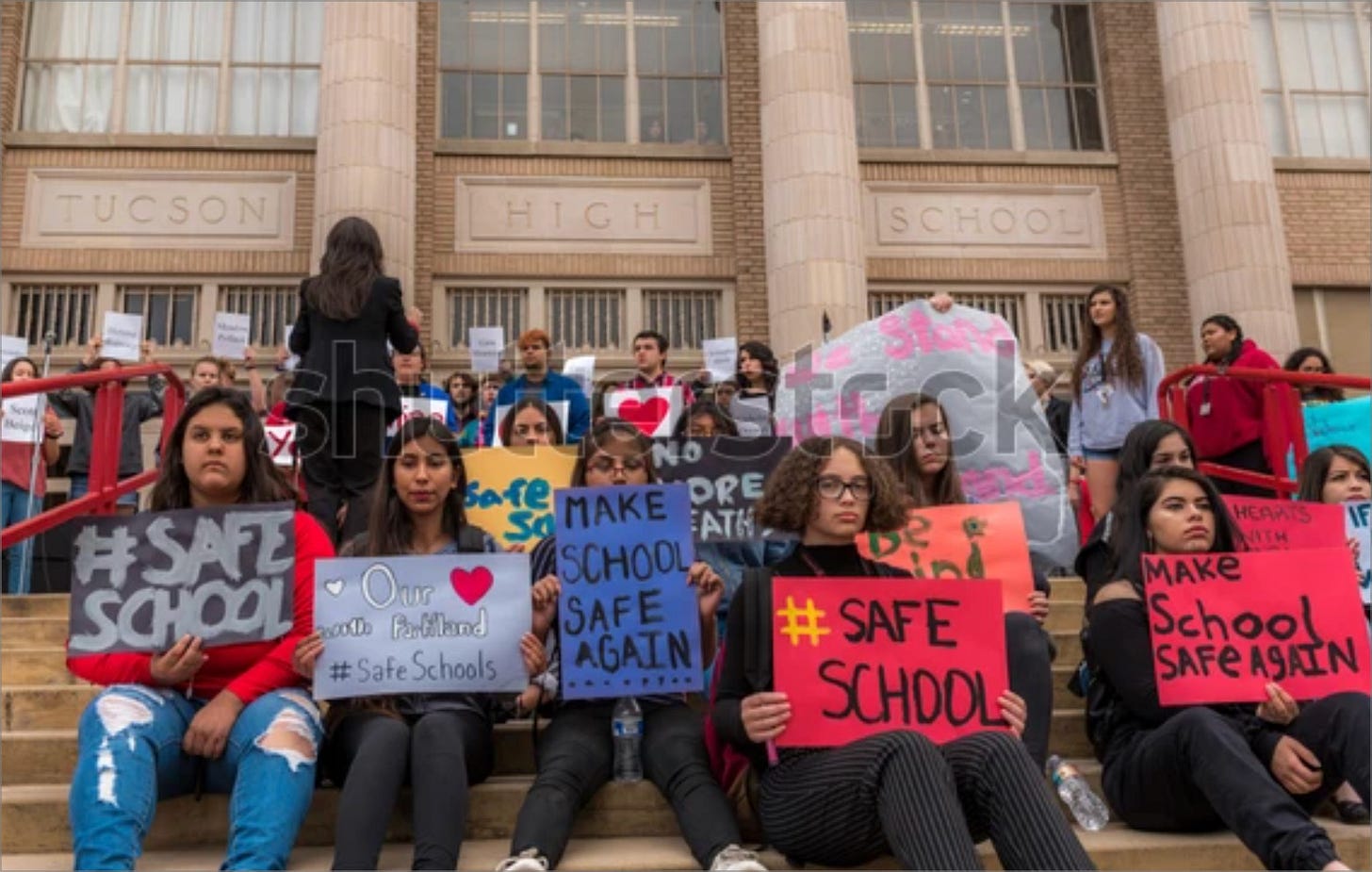📊 The Numbers Don't Lie: TUSD's $480M Bond, 89% Student Failure, and 40% Performance Supe Rating
🔍 Follow the Money: Tracing TUSD's Financial Maze 👥 Voices from the Ground: Students and Teachers Speak Out
This article is based on the latest TUSD Whistleblower email.
😽 Keepin’ It Simple Summary for Younger Readers
👧🏾✊🏾👦🏾
A TUSD whistleblower group just dropped 📦 some major tea about the district's leadership problems! The Nov 2024 election drama 🗳️, budget mess 💰, questionable promotions 📈, and safety concerns at schools 🏫 are all exposed in this 15-page open letter. Big issues at Tucson High and audit problems show how things aren't working right. The group claims Superintendent Trujillo only works part-time but gets full-time pay 🤔, and there's drama about guns on campus being covered up 🚫.
🗝️ Takeaways
🚫 Students report feeling unsafe with drug dealing and violence in hallways
💰 $480M bond money questioned while schools lack basic heating/cooling
👨💼 Superintendent working "part-time" while receiving full-time pay
📉 Academic achievement declining despite administration claims
🤐 Pattern of retaliation against those who speak up
🏫 Flagship school (Tucson High) operating with long-term substitutes
🔍 Internal Auditor blocked from meeting with Board
📉 TUSD Leadership Crisis: A Deep Dive into Whistleblower Claims
🏫 Introduction: The Current Climate of TUSD
An open letter from the TUSD Whistleblower Group on December 13, 2024, signifies a crucial milestone in monitoring Tucson's educational system.
This 15-page report, created by a coalition of current and former TUSD stakeholders, reveals a concerning narrative of dysfunction within Arizona's largest school district. The allegations highlighted provide a clear picture of a system struggling with significant leadership accountability problems, financial transparency, and serious dangers to student safety.
📅 Election Analysis and Board Politics
The recent board elections highlight a clear divide between grassroots educational advocacy and established political practices. Sadie Shaw's re-election stands out as a symbol of integrity amidst the chaos, receiving accolades from whistleblowers who commend her steadfast dedication to student welfare and ethical governance.
In stark opposition, Natalie Luna Rose's re-election sparks serious questions about the board's effectiveness and political strategies. Whistleblowers have raised significant issues regarding her time as board president, pointing out shortcomings in her communication abilities and an unsettling focus on minor issues.
This situation raises doubts about the quality of leadership—or the absence of it—within the district's upper management.
🔥 Leadership Under Fire
The whistleblowers' accusations focus on a thorough examination of Superintendent Gabriel Trujillo’s leadership.
They criticize him for supposedly working only part-time in the district while receiving a full salary. This alarming assertion prompts significant concerns regarding accountability and transparency in the district’s administration.
A recent performance evaluation, which showed only 40% approval of his potential pay raises, raises significant concerns about his effectiveness, particularly given the declining enrollment numbers and unsatisfactory academic performance indicators.
🚨 School Safety Crisis: A System in Free Fall
The whistleblowers' disclosures regarding campus safety reveal a troubling image of institutional shortcomings, with Tucson High Magnet School—formerly TUSD's shining star—becoming the epicenter of these issues.
The decline in safety measures has fostered a climate where students encounter continual threats to their well-being, even as administrators purportedly try to conceal information about these incidents.
A senior's devastating testimony captures the reality of daily life at TUSD's largest high school:
"I hate being at school this year and constantly looking over both shoulders. Last week, some low-life bumped me so hard in the hall my shoulder was displaced. I went home and was taken to urgent care by my auntie. She wanted to report it to the school, but I said it would cause me a lot of trouble with the gangster who did it. The guy who shoved me is a drug dealer, and I saw him sell stuff to a friend of mine in the hall in the Main."
The normalization of violence emerges as a key theme, with the student explaining why they couldn't report the assault:
"The shove was to let me know to keep my mouth shut. There were no adults anywhere and lots of students moving around. It is not very safe because students can do whatever they want."
The letter reveals a troubling pattern of administrative negligence. The whistleblower notes, "Administrators I know are walking through campus like the living dead. Their eyes are blank, and they walk wherever they go without seeing any of us in front of them. The security people are spread out and not in the right places."
Even more concerning are the allegations about weapons on campus. At Mansfeld Middle School, the whistleblowers report that "a loaded gun showed up on the Mansfeld campus. The campus was not placed on lockdown." Instead of following safety protocols, they allege the administration's primary concern was "how to keep the incident out of the public eye."
The breakdown in security extends beyond individual incidents. According to the letter, the systemic issues include:
Regular drug dealing in hallways
Frequent physical altercations
Absence of adult supervision in key areas
Intimidation of students who might report incidents
Security staff positioned ineffectively
Suppression of information about serious safety incidents
Perhaps most troubling is the allegation that "Trujillo and Sanchez demanded absolute silence and a downplay of the situation on the Mansfeld campus. As ordered by Sanchez and the top silencer, Trujillo, parents were not made aware of the matter."
This culture of concealment appears to prioritize the district's image over student safety. The whistleblowers warn ominously that "if lockdown protocols are not followed, someone (student, employee, visitor) on one of our school campuses is bound to get hurt."
⚠️ Internal Power Struggles
Frank Armenta's appointment as Assistant Superintendent highlights the concerning administrative decisions that whistleblowers claim are widespread throughout the district.
Ethically, creating a new leadership position without adhering to standard hiring practices rings alarm bells. Reports of a confrontation between Armenta and Trujillo regarding "scandalous first-hand information" suggest more serious underlying issues in the district's hiring methods.
💰 Financial Oversight Concerns
The whistleblowers reveal troubling trends in TUSD’s financial stewardship.
The $480 million bond, a significant expression of public trust, is shadowed by persistent questions regarding its execution. Alarmingly, reports showing that 89% of students at one school are "failing in academic proficiency" raise urgent concerns about resource allocation and the effectiveness of educational strategies.
Additionally, the substantial salary associated with Armenta's promotion, juxtaposed with the superintendent's reduced performance pay, underscores a disconnect between financial rewards and accountability.
📚 The Decline of Tucson High
Once a proud cornerstone of TUSD, Tucson High Magnet School now represents institutional decline. The dependence on long-term substitute teachers for critical subjects highlights a significant failure to deliver even essential educational resources.
Whistleblowers report distressing instances of students compelled to complete their final year with inadequate instruction, clearly showing how administrative choices endanger student futures.
The striking statement that "the administration saves money on the backs of us kids" starkly condemns misplaced priorities.
🔍 Audit and Oversight Breakdowns
The erosion of internal oversight mechanisms is particularly alarming in TUSD’s current administration.
Despite a direct reporting relationship, the Internal Auditor's failure to connect with the Board indicates an intentional hindrance of crucial oversight duties. Furthermore, releasing audit reports only following community pressure points to a lack of transparency.
This pattern of avoiding scrutiny raises questions about what additional issues may lurk out of the public eye.
😨 A Culture of Fear and Retaliation
Reports reveal a disturbing culture of fear and retaliation within TUSD, where whistleblowers describe an environment that stifles accountability. Principals are pressured into resignations, while staff members face intimidation tactics designed to enforce silence.
Audit committee members express concerns about potential public backlash for speaking out, highlighting a system that punishes transparency. This oppressive climate suppresses dissent and maintains an alarming status quo.
The administration's strategy of publicly shaming community members who raise valid concerns further exemplifies their blatant disregard for accountability and reform.
🏢 Administrative Management and Budgetary Issues
The documented authoritarian management style, epitomized by commands such as "DO AS Dr. TRUJILLO DIRECTS!" reveals a deeply problematic approach to educational leadership.
This hierarchical method sharply differs from contemporary collaborative educational management principles. Claims of altering budget data to hide financial truths point to a concerning inclination to favor appearances rather than authentic solutions.
⏳ Long-Term Educational Consequences
The accumulated effects of these problems lead to serious educational consequences. The removal of magnet status from multiple schools, declining enrollment, and worsening academic results suggest a fundamental failure.
The ongoing reliance on long-term substitutes for core subjects reveals that financial issues prioritize budget over educational quality—most negatively affecting marginalized students and reinforcing cycles of inequity.
📢 Conclusion
Whistleblower disclosures require prompt and decisive action from both the community and oversight organizations.
The issues they reveal go beyond simple administrative shortcomings. They represent a serious breach of public trust and the foundational mission of education. Urgent reforms—which may require external support—are crucial to ensuring TUSD fulfills its obligations to students, families, and the broader Tucson community.
Facing challenges such as financial mismanagement, safety threats, leadership failures, and declining educational quality, TUSD finds itself at a pivotal moment. The testimonies of these whistleblowers, who reflect a range of voices within the educational landscape, underscore pressing systemic concerns that must be addressed.
Despite acknowledged reprisals, their courage to come forward reinforces the essential public interest in promoting transparency and accountability in educational governance.
☕ If you enjoyed this article, give us a tip! We 🤎☕‼️
Key People and Quotes
Gabriel Trujillo (Superintendent)
"Back to working his part-time gig a few days a week"
Received "40% of the eligible performance-based pay" described as "a flat-out failure"
Sadie Shaw (Board Member)
Praised for "ethics based on what is best for students"
Led a "pure grassroots campaign"
Natalie Luna Rose (Board President)
"Can barely put two words together to articulate her thoughts from the dais"
"An absolute empty head who speaks and votes as prompted by Gabe Trujillo"
Frank Armenta (Assistant Superintendent)
Position "had NEVER existed before"
Promoted without "job description... assessment... announcement... selection process"
Former "VERY unsuccessful principal at Cholla High School"
Luke van Schie (Mansfeld Principal)
Asked to leave position
"Deserves better than what TUSD has given him"
Richard Sanchez (Assistant Superintendent)
Former Mansfeld principal
Involved in controversy over handling of safety incidents







